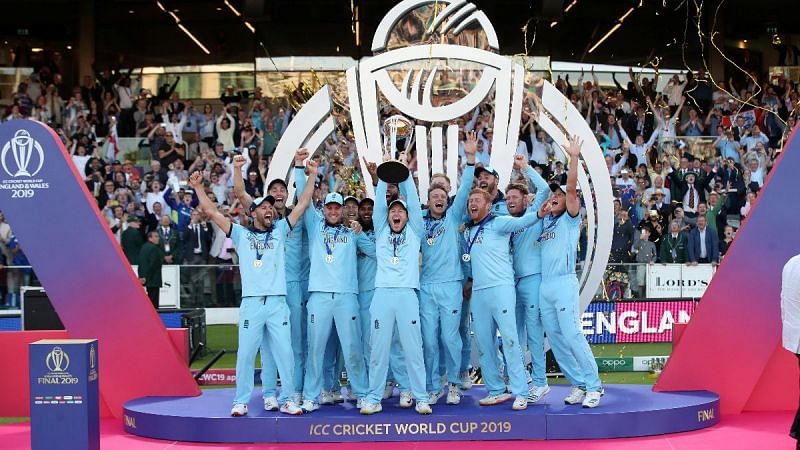
Top-5 Cricket World Cup matches in the 21st century
.

Cricket is a game of uncertainties. One wicket, one boundary, or even a single, any of them can change the complexion of an entire game. Cricket is prone to momentum swings at any instant. The stakes get higher when the tournament happens to be the 50-over World Cup.
India losing to Australia by a single run in the 1987 edition of the competition is but a distant memory. A closer such instance would be South Africa's semi-final clash against Australia in 1999.
The nail-biting proceedings courtesy Lance Klusener's lone-man effort in Edgbaston that day reached the last over. Needing nine runs to win the game, Klusener scythed the first two balls of the over to the boundary to tie the scores. After missing out on the third ball, he ran for the game-winning single off the fourth ball only for the ball-watching Allan Donald getting run out.
Although the match ended in a tie, it was more akin to a defeat grabbed from the jaws of victory for the Proteas. The result was enough to propell Australia to the final where they would win their first of three consecutive titles.
There have also been a few intense matches in the 50-over World Cup in the 21st century. The feeling of winning an intense game is exhilirating. Equally, the pain of losing one is excruciating. On that note, let us have a look at five of the most competitive games in the ICC Cricket World Cup in the 21st century.
5 nail-biting World Cup games in the twentieth century:
5) West Indies vs England, Bridgetown, (Super 8s 2007)
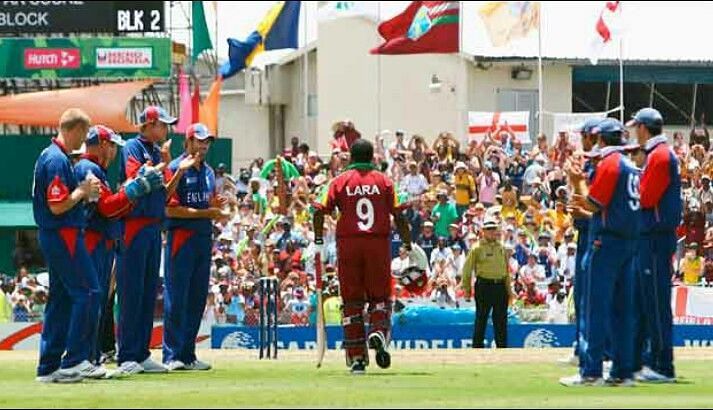
Our fifth pick takes us to a World Cup which is not considered among the most intriguing one in the competition's history. The 2007 edition in the Caribbean isles did have its fair share of close games, though. Lasith Malinga skinning South Africa's lower order with 4 wickets in 4 balls, Paul Nixon and Ravi Bopara stumbling just short of their target against the Lankan lions, it all happened in the West Indies.
In this particular game, the hosts were involved. They set a target of 301 for England. The English chase got off to sloppy bad start as they lost opener Andrew Strauss in the second over. Thanks to some atrocious running between the wickets, England were reduced to 189/6, with three of their batsmen, including Michael Vaughan (79 off 68), succumbing to run-outs.
Needing 80 runs off the last 9 overs, England found respite in their young batsman Kevin Pietersen. Unperturbed by the middle order collapse, Pietersen scored freely and picked up a half-century along the way.
West Indies, however, did have a chance to put the game to bed when 43 runs were needed off 28 balls.Paul Nixon pushed the ball straight to the short mid-on fielder. The running between the wickets had been nothing short of disastrous all day as Nixon and Pietersen were caught in two minds.
Nixon froze seeing the fielder close in on the ball but Pietersen was three-quarters down the track. Luckily for England, the fielder fumbled and Nixon gassed himself out while trying to complete the single. Pietersen, however, was watching if Nixon would make the crease and completely lost track of his own position. The throw came at Pietersen's end and he had to make a last-ditch dive to get in the crease.
For all the goof-ups, Pietersen made amends by smashing the ball over deep mid-wicket to bring up his 5th ODI century. On the very next ball, however, he tried to go big and lost his leg-stump to Jerome Taylor.
Pietersen left the field with England needed 32 off 22. Jerome Taylor struck again in the same over when Liam Plunkett played an ill-advised lofted shot straight to long-on. Three overs to go, 29 runs to get and two wickets remained. But Paul Nixon was still at the crease.
Nixon smashed three fours and got four byes as the 48th over yielded 17 runs. The equation was now run-a-ball. Jerome Taylor kept things tight but Nixon managed to sneak a boundary through fine leg as England came within four runs of a win in the last over.
Stuart Broad took a single to get Nixon back on strike. Dwayne Bravo then bowled a perfect slower ball to clean up Nixon's stumps up.
Three runs to get off four balls and the last man was set to face the music. Bravo went with the slower ball again but there were no fielders close by to stop the single. Another slower ball followed which forced Broad to defend. Off the penultimate ball of the over, Broad's hit over the infield brought about a tense one-wicket win for England.
West Indies had the game in control at various points but Kevin Pietersen and Paul Nixon fought back to keep England in contention. If Nixon had been run-out, things could have panned out differently.
Nevertheless, it was a brilliant game of cricket.
4. New Zealand vs West Indies, Manchester, (2019)
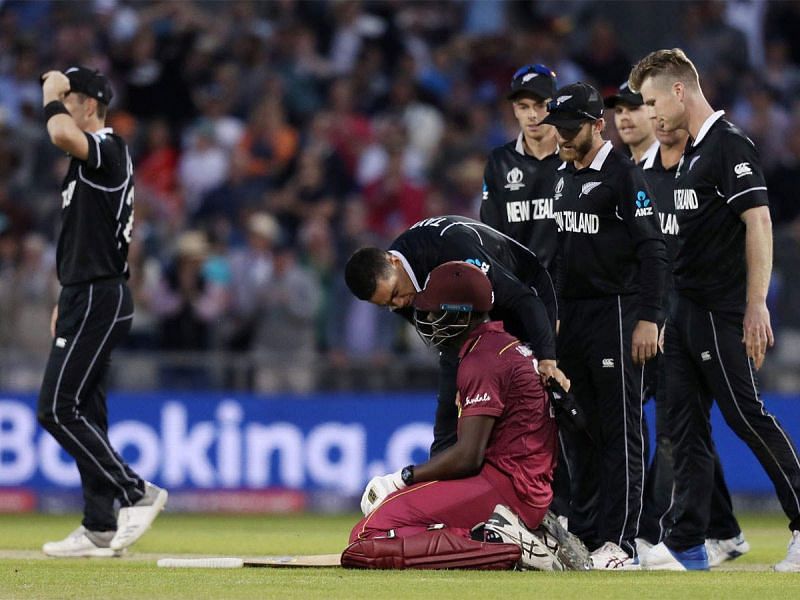
New Zealand and the West Indies played out one of the best games of the 2019 ICC Cricket World Cup in Manchester. From the very first over, the quality of cricket was exceptional. Sheldon Cottrell's exquisite swing sent both Martin Guptill and Colin Munro back to the pavilion for golden ducks. While Guptill fell LBW to a yorker-length ball, Munro was undone by an outswinger that cleaned up his stumps.
Kiwi skipper Kane Williamson then stitched a partnership with Ross Taylor to steady the ship. However, Taylor lost his wicket while trying to attack Chris Gayle. But Williamson carried on and finished with a knock of 148 studded with 14 fours and a six as New Zealand posted 291 on the board.
In response, Trent Boult did a Sheldon Cottrell to wreck early damage in the West Indies innings. Shai Hope dragged a ball onto his stumps while Nicholas Pooran fell while trying to muscle a bouncer.
Chris Gayle and Shimron Hetmyer began the recovery act for the West Indies. Both players reached their half centuries in quick time as West Indies were comfortably perched at 142/2 after 22 overs. The seemingly easy chase looked anything but easy whenWest Indies lost five wickets in as many overs.
Carlos Braithwaite and Kemar Roach were now at the crease but Roach fell in the 38th over with the score at 211. Braithwaite continued to wage a lone battle but lost another partner in the 45th over.
With 46 runs still to get, and Oshane Thomas, who could barely be trusted with the bat, at the other end, Braithwaite began to go for raw-power out of desperation. Matt Henry's 47th over vanished for 26 runs with the over reading 2-6-6-6-4-1.
Only 8 runs were needed off the last two overs as Braithwaite reached 98 not-out. Jimmy Neesham kept things tight, starting the penumlimate over with three dots balls before conceding a couple as Braithwaite completed a richly deserving century. Yet another dot ball meant West Indies needed six runs off seven balls.
Neesham banged the ball in short. In a bid to wrap up the game before the last over, Braithwaite went for a maximum. The ball was seemingly travelling over the ropes but Trent Boult desperately plucked out a catch after recovering to keep his balance.
A brilliant catch ended a brilliant game as Carlos Braithwaite fell just short of repeating his Kolkata heroics in the T20 World Cup.
3. New Zealand vs South Africa, Eden Park (2015)
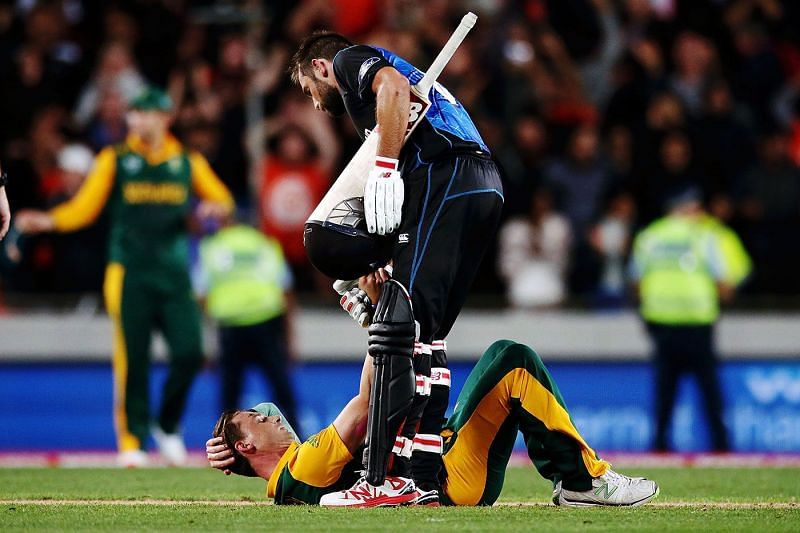
Eden Park is known for its short boundaries and lots of runs. When South Africa and New Zealand met at this ground in 2015, a place in the World Cup final was at stake.
In a rain-hit game, South Africa started brilliantly with the bat as Faf du Plessis scored 82 and AB de Villiers hit a half . When proceedings resumed after rain, David Miller came to the party with a blitzkrieg of 49 off 18 balls.
New Zealand needed to chase down a Duckworth Lewis adjusted total of 298 in 43 overs to reach their first World Cup final..
The NZ captain Brendon McCullum started the chase with a six off Dale Steyn as the Kiwis romped to 70 runs in a mere 6 overs. Once McCullum fell, the Proteas began to chip away and reduced NZ to 4/149 in the 22nd over following Ross Taylor's departure.
With just over 21 overs to go and the target still 149 runs away, the hosts needed something special to win the game. And it came with the partnership between Grant Elliot and Corey Anderson.
Morne Morkel's 38th over once again tightened the noose around New Zealand's neck. They could only get a single in five balls. Anderson impatiently heaved the last ball on the leg side but it flew straight up into the safe palms of Faf Du Plessis. With five overs to go New Zealand were now 252/5.
Needing to defend 29 runs off 18 balls, Dale Steyn came back into the attack and built up more pressure with a tidy over, dismissing Luke Ronchi and conceding only six runs.
23 runs off 12 balls. Morne Morkel was asked to bowl the penultimate over. Morkel also started his over brilliantly giving away just for runs off four balls. It was getting desparate for New Zealand now.
Grant Elliot had to improvise to guide the next ball, full and wide, into the extra cover boundary. He picked up another couple as New Zealand required 13 runs to get off the last over.
It was Dale Steyn vs Grant Elliot but on strike was Daniel Vettori. The Kiwis stole a quick single. Elliot missed out on a full-toss on the next ball and could manage only a single. The equation petered down to 11 runs off 4 balls. The pressure was on the Kiwis despite Steyn feeling his hamstring. The physio was on the field but Steyn wouldn't back away from thenover.
Vettori gathered all his experience to squeeze out a yorker to third man for a much-needed boundary. We all know what happened next. With Grant Elliot on strike, 5 runs were needed off 2 balls, but the batsman needed only one.
Elliot swung his bat for a maximum into the grandstand at Eden Park. The scenes that followed, tears in the eyes of AB de Villiers and Morne Morkel, Dale Steyn laying on the pitch in agony - could have moved any neutral fan to tears.
2. New Zealand vs Australia, Eden Park (2015)
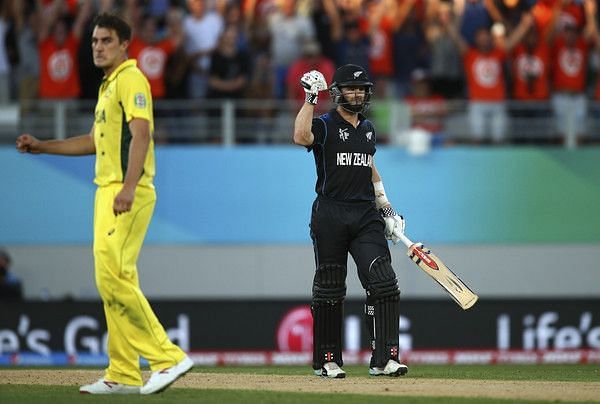
Before the intense high-scoring semi-final at Eden Park, New Zealand and Australia met in the group stages of the 2015 World Cup to play an enthralling low-scoring encounter.
Trent Boult and Mitchell Starc were the protagonists of the game. First, it was Boult who ran through the Australian middle-order. Glenn Maxwell became Boult's first victim when the batsman dragged the ball onto his stumps.
Mitchell Marsh suffered a similar fate by playing on in the same over. Michael Clarke was caught at short cover-point by Williamson before Mitchell Johnson also fell playing a similar shot. Boult completed his fifer with a peach of a swing delivery to Starc as Australia were bundled out for 151 in 32 overs.
New Zealand seemed to be in a hurry to finish things off as was evident by McCullum's quick start. Now it was Mitchell Starc's turn to make the ball dance to his tunes. Guptill chipped one to Pat Cummins at mid-off.
The hosts rode on with Kane Williamson and Brendon McCullum though as Starc was taken off the attack. Once McCullum was dismissed, Starc was brought back into the attack and the left-armer began to wreck New Zealand.
Starc brought a sharp full delivery back in to clean up Ross Taylor's stumps. He delivered another sharp inswinging yorker to Grant Elliot as the batsman was bowled first ball.
With New Zealand needing just six runs to win with three wickets in hand, Starc cleaned Adam Milne up with a full delivery on the middle stump. On the very next ball, he rattled the off stump of Tim Southee with a vicious swinging delivery.
Boult had cleaned Starc up when the former was bowling earlier in the game. Now Boult had to see off two balls from Starc before Williamson could get on strike. The Australian pacer targetted middle and leg but not quite find the yorker as Boult watchfully defended. Starc went yorker-length with dangerous swing again. The ball, however, missed the off stump by a whisker as Boult survived.
Back on strike in the next over, Williamson smashed a six to end a highly intense game of cricket. The crowd came to see good cricket and boy was it some game they witnessed!
1. England vs New Zealand, Final (2019)
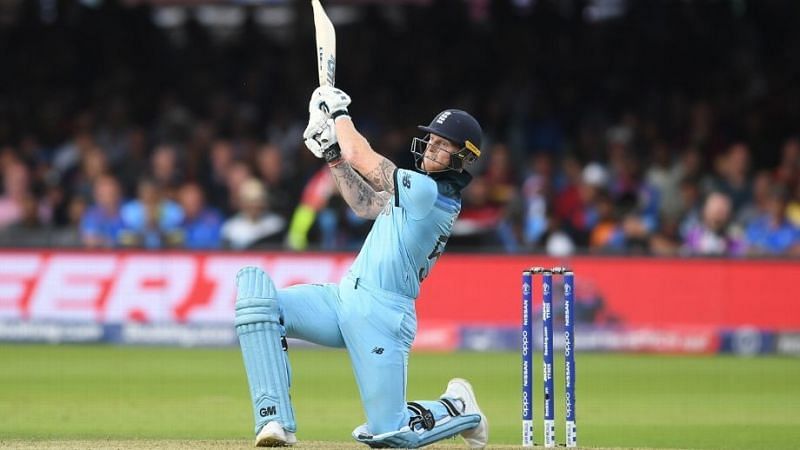
The home of cricket in Lord's saw the best ever World Cup final played between hosts England and New Zealand. In overcast conditions, the Kiwis found useful contributions from Henry Nicholls, Kane Williamson and Tom Latham to put up 241 runs on the board.
England lost Jason Roy and Joe Root cheaply. Lockie Ferguson and James Neesham then struck a twin blow to send back Jonny Bairstow and Eoin Morgan as England slumped to 86/4 in the 23rd over.
Jos Buttler and Ben Stokes put up a 100-run partnership to get the English chase back on track. But Lockie Ferguson again came to torment England by dismissing Jos Buttler as Tim Southee took a good catch at deep point.
The equation came down to 24 runs off the last two overs.
Jimmy Neesham started the penultimate over with two singles and the wicket of Liam Plunkett. In the fourth ball of the over, Ben Stokes skied one to deep mid-wicket. Trent Boult took the catch but stepped over the ropes. It was a lucky escape for England as six runs got added to their total instead of losing Stokes. England then lost their eighth wicket as Jofra Archer headed back to the pavilion.
It was now Trent Boult vs Ben Stokes, with England needing 15 runs to win.
The Kiwi pacer started with two dots. Stokes dragged the third ball from outside off stump to the deep mid-wicket boundary for a six. 9 off 3. Then came a bizarre moment.
Stokes worked the ball to mid-wicket and ran for the second. But Martin Guptill's throw hit Stokes' bat and ricocheted to the boundary. The batting side were awarded six runs.
Needing three to win off two balls, Stokes ran to get a couple of runs as there were two run-outs at the other end. The game was tied and a super over ensued.
New Zealand required 15 runs to win. Jimmy Neesham left two to get from one ball for Martin Guptill. It was Guptill's first ball of the over and he could only manage a single, getting run-out while going for the second. The scores were tied again and England won by a controversial maximum-boundary rule.